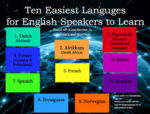Introduction
Learning a new language might seem like scaling Mount Everest, but some languages are far less intimidating than others—especially for the easiest language to learn for English speakers. This guide explores the easiest options and why they’re within reach for you.
Why Learn a New Language?
Learning a new language isn’t just a fun challenge—it opens doors to exciting opportunities. Whether you’re looking to connect with new cultures, advance your career, or simply give your brain a workout, picking up a second language is always a great choice.
Personal and Professional Benefits
Knowing another language makes you stand out in the job market and allows you to connect with people on a deeper level. Want to impress during a vacation? Speak the local language. Networking in international business? A second language might seal the deal.
Cognitive Advantages of Language Learning
Think of your brain as a muscle—language learning is like its gym membership. It improves memory and problem-solving skills, and even delays age-related cognitive decline. Pretty cool, right?
Factors That Determine Language Learning Ease
Several factors influence how easy or difficult it is to learn a new language. These factors can vary significantly based on individual learners and external conditions:
Similarities in Grammar and Vocabulary
Some languages have similar grammar structures or share vocabulary roots with English. The closer the language is, the easier it is to pick up.
Pronunciation Challenges
Languages with sounds that easiest language to learn for English speakers find familiar are easier to master. Tricky pronunciations can slow you down, but don’t worry—they’re not deal-breakers.
Cultural Exposure and Resources
Having access to resources, native speakers, and cultural immersion opportunities can make or break your language-learning journey.
Top Languages That Are Easy for English Speakers
For English speakers, certain languages are easier to learn due to shared linguistic roots, similar grammar structures, or straightforward pronunciation. Here’s a list of some of the easiest languages:
Spanish
Why Spanish Is Easy
Spanish boasts straightforward grammar, phonetic spelling, and plenty of shared vocabulary with English. Words like “fantástico” and “delicioso” are practically the same!
Tips for Learning Spanish
Use apps like Duolingo or watch Spanish shows on Netflix. Trust me, telenovelas are addictive and educational.
French
Why French Is a Good Option
French shares many Latin-based roots with English, making vocabulary a breeze. Plus, it’s one of the most romantic languages out there—literally and figuratively.
Overcoming French Pronunciation Hurdles
Those nasal vowels can be tricky, but practice makes perfect. Listen to French music or podcasts to get the hang of it.
Italian
What Makes Italian Beginner-Friendly
Italian is rhythmic, phonetic, and fun to speak. It also has a simple verb system, so you’ll be singing “Volare” in no time.
Fun Ways to Practice Italian
Cook Italian recipes and learn food-related vocabulary while you eat. Buon appetito!
Portuguese
Portuguese Similarities with English
Like Spanish, Portuguese shares many Latin roots. It’s musical and expressive, making it enjoyable to learn.
Variations Between European and Brazilian Portuguese
Decide which version to learn based on your interests. Brazilian Portuguese is more widely spoken, while European Portuguese has a unique charm.
Dutch
English-Like Grammar in Dutch
Dutch feels like a quirky cousin of English, with a similar sentence structure and many familiar words.
Common Pitfalls When Learning Dutch
Watch out for false friends (words that look similar but have different meanings). They can trip you up!
Swedish
Simple Grammar Rules in Swedish
Swedish grammar is a dream—no verb conjugations based on subject pronouns. Easy, peasy!
Resources for Swedish Learners
Dive into Swedish culture with YouTube channels or practice with free online courses.
Honorable Mentions
While German and Norwegian aren’t as easy as the languages above, they’re still worth considering. German is logical and structured, while Norwegian is closely related to Swedish.
Tips to Accelerate Language Learning
Learning a new language can be accelerated by adopting effective strategies. Here are key tips to boost your progress:
Using Technology and Apps
Apps like Babbel and Memrise turn learning into a game. You won’t even realize you’re studying.
Practicing With Native Speakers
Join a language exchange group or find a conversation partner online. Real-life practice is priceless.
Setting Realistic Goals
Start small. Commit to learning 10 words a day or practicing for 15 minutes. Little by little, it adds up.
Conclusion
We desire that you now know the answer to the query so many people have on their thoughts after they set the goal of mastering a new language: What are the easiest languages to examine for the English audio system? There are objective and subjective solutions to that question, so make sure to take your private goals into account when selecting. Being motivated enough or immersed sufficiently in a language can mean the perfect language could without difficulty change by way of being the only one you are greatly stimulated or have the best opportunity to study.
FAQs
- What is the easiest language to learn for English speakers?
Spanish is often considered the easiest due to its simple grammar and pronunciation. - How long does it take to become fluent in a new language?
It depends on the language and your dedication. For easy languages to learn for english speakers, 6 months to 1 year is a good target with consistent effort. - Can I learn a language without traveling to a foreign country?
Absolutely! Online resources, language apps, and native speakers make it possible from anywhere. - Is it harder to learn a language as an adult?
Adults can learn languages effectively. It might take more focus than it does for kids, but adults have better cognitive strategies. - Should I focus on speaking or writing first?
Speaking is more practical for most learners. Writing will naturally improve as you grow more comfortable with the language.

